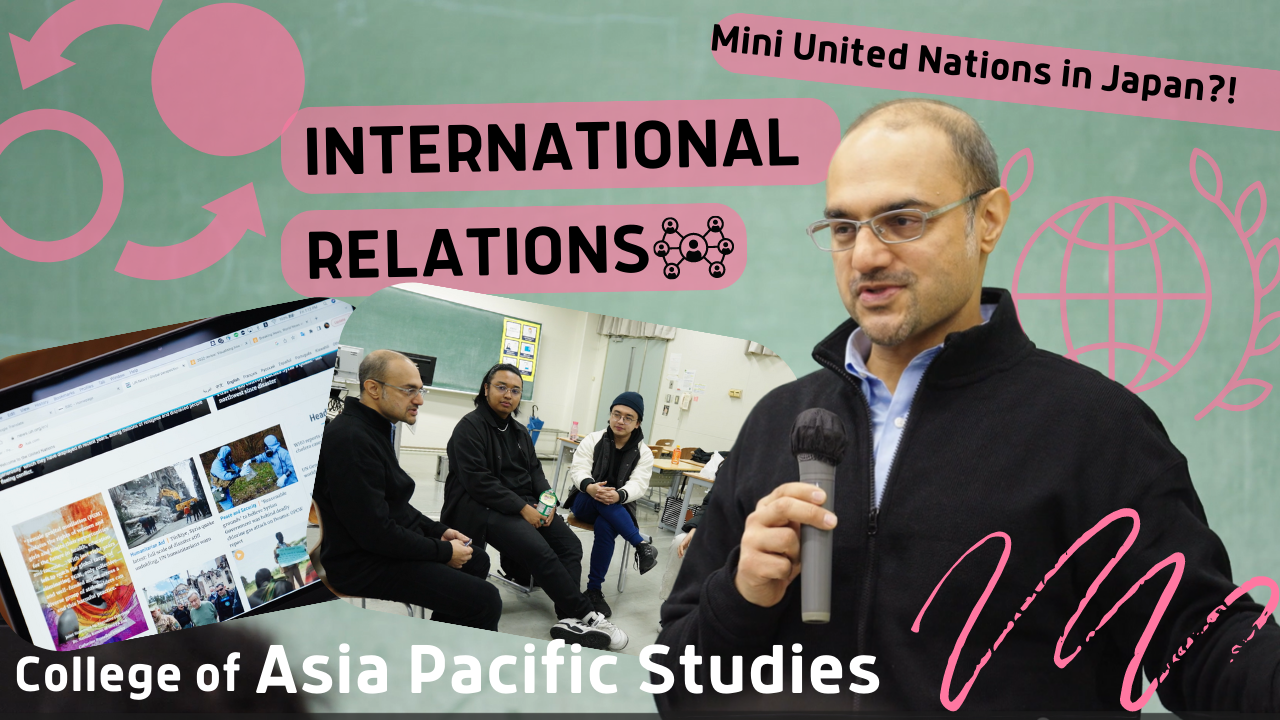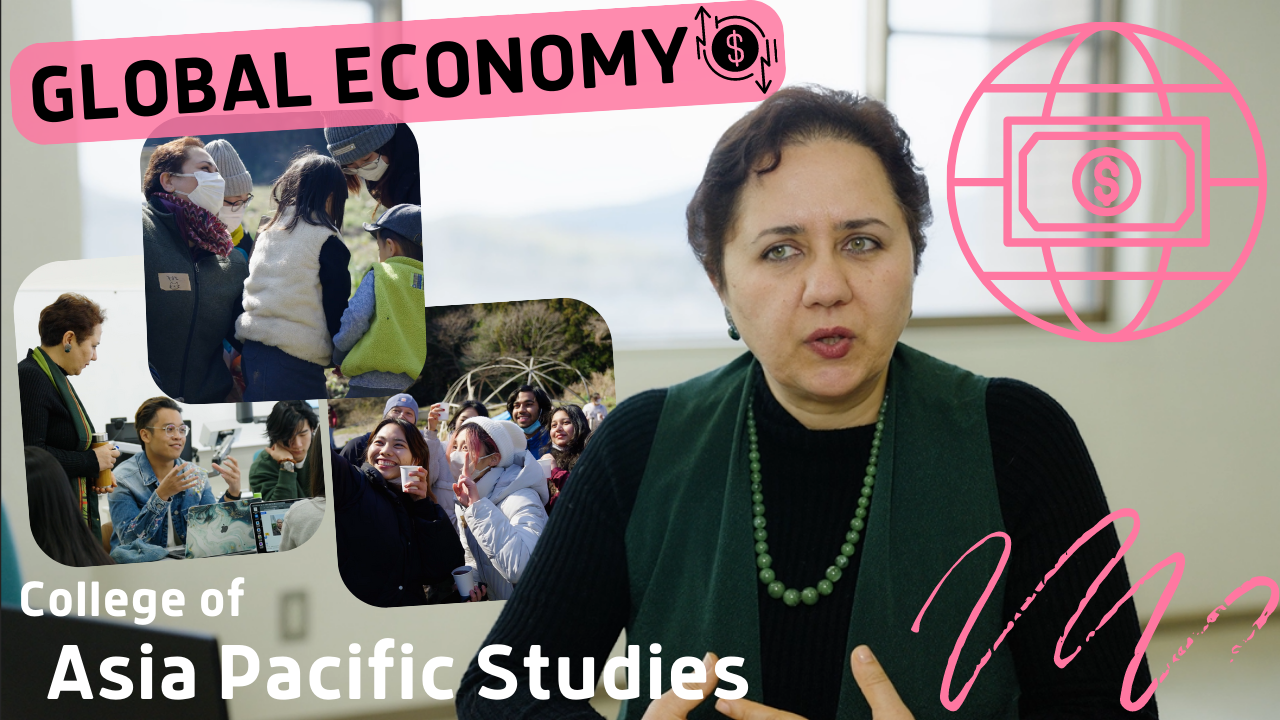College of Asia Pacific Studies (APS) | APU Ritsumeikan Asia Pacific University

College of
Asia Pacific Studies (APS)
A Breakdown of the College of Asia Pacific Studies (APS)
At APS, we challenge you to tackle a vast array of global issues and develop new ways of thinking to face these obstacles head-on. You will gain a broad understanding of the political systems, economies, societies, and cultures of the Asia Pacific region while gathering relevant skills in language and information technology. APS prepares students for a wide variety of careers in government, international organizations, media, and multinational corporations.
APS students take introductory courses in political science, sociology, and economics. Building on foundational knowledge from these three areas, students pursue their major disciplinary study into upper-level courses while choosing electives from other disciplines to broaden their perspectives. The diverse menu of active learning at APS includes overseas exchange study, internships, and field studies. Through seminar classes and a thesis or report, students demonstrate their comprehensive and holistic understanding of the issues faced by the Asia Pacific region.
Areas of Study
APS has established 3 areas of study in order to conduct education and research for the development of wide-ranging problem solving ability and specialized know-how of the issues facing the Asia Pacific region. Studies are centered on solid language proficiency and a basic understanding of the diverse cultures, histories, societies, natural environments, and historical conditions of the Asia Pacific region.
Culture, Society and Media
This area of study enables you to analyze the societies, cultures, and values of the Asia Pacific to deepen your understanding of the issues this region faces. You will gain a global perspective, fundamental media skills, and the ability to view societal issues from several angles.
Global Economy
This area of study offers advanced training in economics and its various subsets. Become an expert in a specialized field of global economics, such as regional economies, inequality, poverty, energy, food, agriculture, nature, industrialization, pollution, health, and digitalization.
International Relations
This area of study allows you to delve into the intricacies of conflict resolution and peace-building as well as cultivate the ability to deal with increasingly complex global issues. Your studies will draw from international law, political science, and economics to help you develop critical thinking skills and a policy-oriented approach for success in the field.
*Curriculum for transfer-students:
2nd-year transfer students who enrolled from AY 2018 to AY 2023 or 3rd-year transfer students who enrolled from AY 2019 to AY 2024 should follow the 2017 curriculum.
For more information on the curriculum and courses, visit the Academic Office website.
APS Subject List
In your first year, you will start out taking liberal arts courses. These interdisciplinary classes are designed to give you a foundation to build upon for when you start your major-specific courses in your second year. You also have the opportunity to personalize your study pathway and take a number of courses both within and outside your major throughout your studies at APU.
COMMON LIBERAL ARTS SUBJECTS
APU Literacy
- Student Success Workshop
- Multicultural Cooperative Workshop
- Peace, Humanity and Democracy
- Introduction to Intercultural Communication
- Intercultural Fieldwork I–II
- Studies of Multicultural Comparison
- Foundation for Global Leadership
- Overseas Learning Design
- Bridge Program
- Languages of the Asia Pacific
- Religions of the Asia Pacific
- Geography of the Asia Pacific
- Culture and Society of the Asia Pacific
- History of the Asia Pacific
- Japanese Politics and Society
- Popular Culture of Japan
- Japanese History
- Constitution of Japan
- Special Lecture (Japanese Studies)
- Applied Intercultural Communication
- Skills and Practices for Global Leadership
- Global Leadership for Social Impact
- Japanese Art of Tea Ceremony
- Japanese Art of Flower Arrangement
- Traditional Japanese Arts
Introduction to Major Studies Group
- Introduction to Sustainable Development
- Introduction to Tourism and Hospitality
- Introduction to Policy Studies
- Introduction to Sociology
- Introduction to Culture and Society
- Introduction to Media Studies
- Introduction to International Relations
- Introduction to Comparative Politics
- Introduction to Political Science
- World Economy and Global Issues
- Introduction to Economics
- Fundamental Mathematics
- Statistics
- Statistics for Social Sciences
- Advanced Mathematics
Global Citizens Foundation
- Legal Studies
- Psychology
- Bioethics
- AI and Society
- Western Philosophy
- Chinese Philosophy
- Western Visual Arts
- Modern Science and Technology
- Negotiation Skills
- Logic and Critical Thinking
- Self‐analysis for Career Design
- Diverse Perspectives on Understanding Careers
- Special Lecture (Liberal Arts Subject)
- Web Design
- Information Processing Essentials
- Programming Essentials
- Information Literacy
- Health Science
- Media Production Lab
- Internship
- Career Field Analysis for Career Development
- AI and Data Science
- Introduction to GIS
- Database Systems
- Special Lecture (ICT)
- Information Systems Programming
LANGUAGE EDUCATION SUBJECTS
Japanese Language Classes
- Japanese Course (Foundation/Intermediate/Pre-Advanced/Advanced)
- Career Japanese
- Language and Culture in Japan
- Language and Social Topics in Japan
- Kanji and Vocabulary Skills
- Japanese for Self-expression
- Japanese Communication Skills
English Language Classes
- English Course (Foundation/Pre-Intermediate/Intermediate/Upper-Intermediate/Advanced)
- English for Discussion and Debate
- English of the Media
- English for Journalism
- English for Business A
- English for Hospitality and Tourism
- English Communication Skills
- English for Business B
- Reading Fiction in English
Asia Pacific Language Classes
- Chinese I – III, Global Language Learning
- Korean I – III, Global Language Learning
- Malay/Indonesian I – III、, Global Language Learning
- Spanish I – III, Global Language Learning
- Thai I – III, Global Language Learning
- Vietnamese I – III, Global Language Learning
Specific Language Classes
- English Proficiency Test Preparation Course I – III
- TESOL
- Japanese Linguistics for Japanese Language Education
- Japanese Language Teaching
- Introduction to Asia Pacific Languages
- Intensive Language Learning
- Special Lecture (Language Education Subject)
APS SUBJECTS
Culture, Society and Media (CSM)
- Sociology
- Transnational Sociology
- Advanced Sociology
- Social Theory
- Social Stratification
- Religion and Society
- Education and Society
- Language and Society
- Environment and Society
- Food System and Society
- Global Poverty
- Globalization and Regionalism
- Ethnicity and the Nation State
- Multiculturalism and Society
- Identity and Politics
- Gender Studies
- Cultural Anthropology
- Cultural Studies
- Media and Culture
- Media and Law
- Media and History
- Media and Politics
- Media and Conflict
- Digital Technology and Society
- New Media and Society
- Global History
- A World History of Interaction
- Political Theory
- Human Rights
- Peace Studies
- The Humanities and Modernity
- Social Psychology
- Big Data Analysis
Global Economy
- Social Stratification
- Transnational Sociology
- Cultural Anthropology
- Microeconomics
- Macroeconomics
- Agriculture and Resources
- Food System and Society
- Environment and Society
- Analysis of Global Economy
- Global Poverty
- Econometrics
- Game Theory
- International Cooperation
- Politics of Development
- Comparative Political Economy of the Asia Pacific
- Conflict and Development
- Project Management
- Energy Management
- Big Data Analysis
- Behavioral Economics and Experimental Economics
- Japanese Economy
- International Economics
- Asian Economy
- Development Economics
- Industrial Ecology
- Environmental Communication
- Global Health Economics
- American Economy
- European Economy
- International Organizations
- Public Policy
- International Political Economy
- Special Lecture (Economic Issues in Asia, Middle East & Africa)
- International Finance
- Environmental Economics
International Relations
- International Relations Theory
- International Cooperation
- Human Rights
- Political Theory
- Politics of Development
- Comparative Political Economy of the Asia Pacific
- History of International Politics
- International Law
- Global Issues and Policies
- Conflict and Development
- Peace Studies
- Globalization and Regionalism
- International Relations in the Asia Pacific
- International Organizations
- Public Policy
- International Political Economy
- Identity and Politics
- Geo-Politics and Post Cold War Conflicts
- Violence and Terrorism
- Globalization and Law
- International Conflict Resolution
- Foreign Policy of Japan
- Strategic Decision Making
- Ethnicity and the Nation State
- Media and Politics
- Media and Conflict
Core Subject
- Introduction to Area Studies
APS Common Subjects
- Special Lecture (Asia Pacific Studies)
- APS Field Study
- Area Studies
- Field Research Project
- Venture Entrepreneurship ication
- Research Design and Method
Seminar Subjects
- Introduction to Research in Asia Pacific Studies
- Research Method
- Major Seminar
- Graduation Research I–II
- Graduation Thesis
See here for more information about APS
Link to external page

